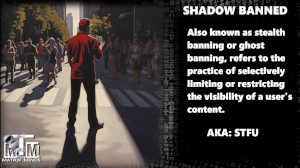 Shadow banning, also known as stealth banning or ghost banning, refers to the practice of selectively limiting or restricting the visibility of a user’s content on social media platforms or online communities without their knowledge. While it is not explicitly illegal in most jurisdictions, the legality of shadow banning can vary depending on the specific circumstances and the laws of the country in question.
Shadow banning, also known as stealth banning or ghost banning, refers to the practice of selectively limiting or restricting the visibility of a user’s content on social media platforms or online communities without their knowledge. While it is not explicitly illegal in most jurisdictions, the legality of shadow banning can vary depending on the specific circumstances and the laws of the country in question.
From a legal standpoint, social media platforms and online communities generally have the right to enforce their own terms of service and community guidelines. This gives them the authority to moderate and manage user-generated content within their platforms. However, they are typically expected to exercise these powers in a transparent and fair manner, without engaging in discriminatory or unfair practices.
Shadow banning becomes controversial when it is used to suppress or censor certain individuals or groups based on their viewpoints, beliefs, or affiliations. If shadow banning is applied in a manner that violates anti-discrimination laws, infringes upon freedom of speech or expression, or selectively targets specific individuals or protected classes, it could potentially raise legal concerns.
The legality of shadow banning may also depend on the jurisdiction’s specific laws regarding online speech, privacy, and consumer protection. For instance, some countries have implemented legislation to protect users’ rights to freedom of expression and prohibit unjustified censorship by online platforms.
It is worth noting that social media platforms have the responsibility to clearly communicate their content moderation policies and inform users if their content is being limited or restricted. Transparency and fairness are key factors in maintaining a legal and ethical approach to content moderation practices.
In summary, while shadow banning is generally not explicitly illegal, its legality can be influenced by factors such as anti-discrimination laws, freedom of speech protections, and the transparency and fairness of content moderation practices. It is advisable for social media platforms and online communities to operate within legal boundaries and uphold principles of fairness and transparency in their content moderation strategies.
Certainly, the practice of shadow banning can have significant repercussions for the platforms that employ it. While it may not always be illegal, it can still lead to negative consequences such as a loss of users and damage to a platform’s reputation. Here are some reasons why platforms that engage in shadow banning may experience customer attrition:
- Lack of Transparency and Trust: Shadow banning is often carried out covertly, without notifying the affected users. When users discover that their content is being suppressed without any clear reason or explanation, it erodes trust in the platform. Transparency is crucial for building and maintaining user confidence, and the absence of transparency can drive users away.
- Perception of Bias and Censorship: Shadow banning raises concerns about biased content moderation and potential censorship. If users perceive that a platform is selectively silencing certain viewpoints or opinions, it can create a perception of unfairness and favoritism. This perception can lead users to seek alternative platforms that are perceived as more open and unbiased.
- Negative User Experience: Shadow banning can significantly impact a user’s experience on a platform. When users are unaware that their content is being suppressed, they may feel frustrated and confused about the lack of engagement or visibility their posts receive. Over time, this dissatisfaction can drive users to look for platforms where their content is valued and reaches a wider audience.
- Loss of Engaging Content: Shadow banning can lead to a decline in the quality and diversity of content on a platform. If users feel that their contributions are being hidden or dismissed, they may be less motivated to create engaging content or participate actively in discussions. As a result, the platform may lose out on valuable user-generated content, which can diminish its overall appeal and relevance.
- Competition and User Migration: In a highly competitive digital landscape, users have a wide array of platforms to choose from. If a platform is perceived as engaging in shadow banning or unfair content moderation practices, users may migrate to alternative platforms that offer a more open and inclusive environment. This can result in a loss of user base and influence for the platform.
To thrive in the digital ecosystem, platforms must prioritize transparency, fairness, and user trust. Implementing clear content moderation policies, providing explanations for actions taken, and addressing user concerns can help platforms retain their users and maintain a positive reputation. Building an environment where users feel heard and valued can go a long way in establishing long-term customer loyalty.




Leave a Reply
Want to join the discussion?Feel free to contribute!